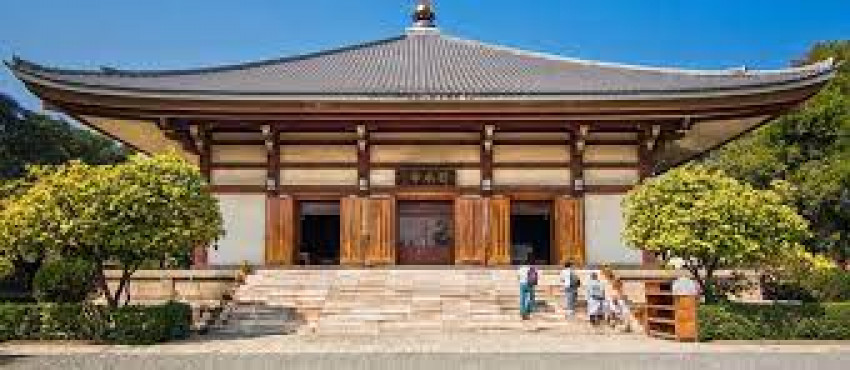
Indosan Nippon Japanese Temple
Duration
1 to 1 Days
1 to 1 Days
Best time to visit
Oct-Feb
Oct-Feb
Theme
Religious, Heritage
Religious, Heritage
Indosan Nippon Japanese Temple Travel Guide
Located in the heart of India, the Indosan Nippon Japanese Temple is a serene destination that holds deep cultural significance. The temple serves as a symbol of the strong bond between India and Japan, showcasing a blend of architectural styles and spiritual practices. Visitors can explore the rich history of the temple and immerse themselves in its peaceful ambiance, making it a must-visit destination for those seeking tranquility and cultural enlightenment.Top Attractions in Indosan Nippon Japanese Temple
1. Peace Pagoda 2. Meditation Hall 3. Japanese Garden 4. Cultural Performances 5. Tea Ceremony ExperienceIndosan Nippon Japanese Temple is Famous for
Its tranquil environment and unique blend of Indian and Japanese cultural influences.Top Attractions in Indosan Nippon Japanese Temple
- Peace Pagoda - Meditation Hall - Japanese Garden - Cultural Performances - Tea Ceremony ExperienceWhat's Great about Travelling to Indosan Nippon Japanese Temple?
- Spiritual seekers looking for a peaceful retreat - Cultural enthusiasts interested in Indian-Japanese fusionWhat's Not So Great about Travelling to Indosan Nippon Japanese Temple?
- Those seeking vibrant nightlife and shopping experiences - Travelers with limited interest in cultural explorationTravel Tips for Indosan Nippon Japanese Temple
- Visa on arrival for most nationalities - Opt for guided tours for a richer experience - Respect local customs and traditions - Wear comfortable footwear for temple visitsImportant Indosan Nippon Japanese Temple trip information
- Ideal Duration: A day trip is sufficient to explore the temple and its surroundings.
- Best Time to Visit: Visit during the cooler months of October to March for pleasant weather.
- Nearby Airports and Railway Stations: The nearest airport is in Varanasi, and the closest railway station is Sarnath Junction.
FAQ's on Indosan Nippon Japanese Temple
Q1: What is the best time to visit Indosan Nippon Japanese Temple?
The best time to visit Indosan Nippon Japanese Temple is during the spring months of March to May when the weather is pleasant with cherry blossoms in bloom. Avoid the rainy season from June to September and the cold winter months from December to February. Consider visiting during special events or festivals for a unique experience.
Q2: Do I need a visa to travel to Indosan Nippon Japanese Temple?
Most visitors to Indosan Nippon Japanese Temple need a visa. However, there are visa exemptions for certain countries for short stays. It is advisable to check the specific visa requirements based on your nationality before planning your trip.
Q3: What are the must-visit attractions in Indosan Nippon Japanese Temple?
Indosan Nippon Japanese Temple offers a range of attractions, including serene gardens, historic temples, and traditional tea houses. Don't miss iconic sites like the Zen garden, meditation halls, and cultural exhibits showcasing Japanese art and architecture.
Q4: Is Indosan Nippon Japanese Temple a safe place to travel?
Indosan Nippon Japanese Temple is generally a safe destination for travelers. However, it is recommended to stay vigilant in crowded areas and be cautious of pickpockets. Avoid walking alone at night and follow local guidelines for a hassle-free experience.
Q5: What is the local currency in Indosan Nippon Japanese Temple and can I use credit cards?
The local currency in Indosan Nippon Japanese Temple is the Japanese Yen. Credit cards are widely accepted in cities and tourist areas, but it is advisable to carry cash for smaller establishments and rural areas. ATMs are also readily available for currency exchange.
Q6: What is the local cuisine like in Indosan Nippon Japanese Temple?
offers a diverse culinary experience, with popular dishes like sushi, ramen, tempura, and matcha tea. Explore traditional Japanese dining etiquette and savor the flavors of fresh seafood, rice dishes, and unique desserts like mochi.
Q7: What transportation options are available in Indosan Nippon Japanese Temple?
Transportation options in Indosan Nippon Japanese Temple include efficient public transport systems like trains and buses, as well as taxis and rental services for convenient travel. Consider purchasing a Japan Rail Pass for cost-effective and easy access to different regions.
Q8: Are there any cultural norms or etiquette I should be aware of when visiting Indosan Nippon Japanese Temple?
Respect local customs in by bowing when greeting, removing shoes before entering homes or temples, and practicing proper table manners. Learn about Japanese traditions like tea ceremonies, onsen etiquette, and the importance of harmony and respect in social interactions.
Q9: I am a travel agent. How can I buy travel leads of Indosan Nippon Japanese Temple?
Register yourself as a travel agent at agents.tripclap.com and then you can buy travel leads to Indosan Nippon Japanese Temple once your account is approved. For more details contact our support team at +91-8069186564 or support@tripclap.com
